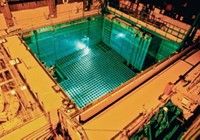Advertisement
Grab your lab coat. Let's get started
Welcome!
Welcome!
Create an account below to get 6 C&EN articles per month, receive newsletters and more - all free.
It seems this is your first time logging in online. Please enter the following information to continue.
As an ACS member you automatically get access to this site. All we need is few more details to create your reading experience.
Not you? Sign in with a different account.
Not you? Sign in with a different account.
ERROR 1
ERROR 1
ERROR 2
ERROR 2
ERROR 2
ERROR 2
ERROR 2
Password and Confirm password must match.
If you have an ACS member number, please enter it here so we can link this account to your membership. (optional)
ERROR 2
ACS values your privacy. By submitting your information, you are gaining access to C&EN and subscribing to our weekly newsletter. We use the information you provide to make your reading experience better, and we will never sell your data to third party members.
Environment
Fuel-Reprocessing Plan Takes A Hit
National Research Council urges cuts for DOE's Global Nuclear Energy Partnership
by Jeff Johnson
November 5, 2007
| A version of this story appeared in
Volume 85, Issue 45
CUTS IN FUNDING and the pace of a Department of Energy program to jump-start commercial reprocessing of spent nuclear fuel were urged by the National Research Council in a report released last week. Instead, NRC says, DOE should scale up programs to support new commercial nuclear power plants.
The Global Nuclear Energy Partnership (GNEP), which DOE announced in 2006, is a multi-billion-dollar program to aggressively pursue a closed nuclear fuel cycle to reprocess spent fuel and burn it for electricity. It would include construction of the world's largest reprocessing facility and at least 30 new nuclear reactors (C&EN, June 18, page 48).
The U.S. has not reprocessed spent nuclear fuel for more than 30 years because of nuclear weapons proliferation concerns due to the plutonium separated by reprocessing. Currently, some 250 tons of weapons-usable plutonium is held at plants in countries that have chosen to reprocess spent fuel.
"We can't see the reason to jump ahead to the commercial reprocessing level," says Robert W. Fri, chair of the NRC committee that prepared the report and visiting scholar at the nonpartisan think tank Resources for the Future. "We don't see the urgency, and we think skipping the engineering-scale step is too big a technical risk and is likely to backfire. We also don't think this is economical enough for the private sector to step up, and so we may be looking at a big financial burden for government."
Nevertheless, all but two members of the 17-person NRC committee recommended that DOE continue reprocessing research but at a reduced level, Fri notes.
NRC's findings on GNEP are based on "faulty premises that are inconsistent with DOE's fuel-cycle R&D program," contends Dennis Spurgeon, DOE assistant secretary for nuclear energy. In a statement, Spurgeon says, however, that he was pleased NRC endorsed DOE's program to build new plants and the department's pursuit of closed nuclear fuel-cycle research.
GNEP has had many critics, including congressional appropriation committee leaders who have reduced its funding below levels sought by the Bush Administration.
The report is online at www.nas.edu.





Join the conversation
Contact the reporter
Submit a Letter to the Editor for publication
Engage with us on Twitter